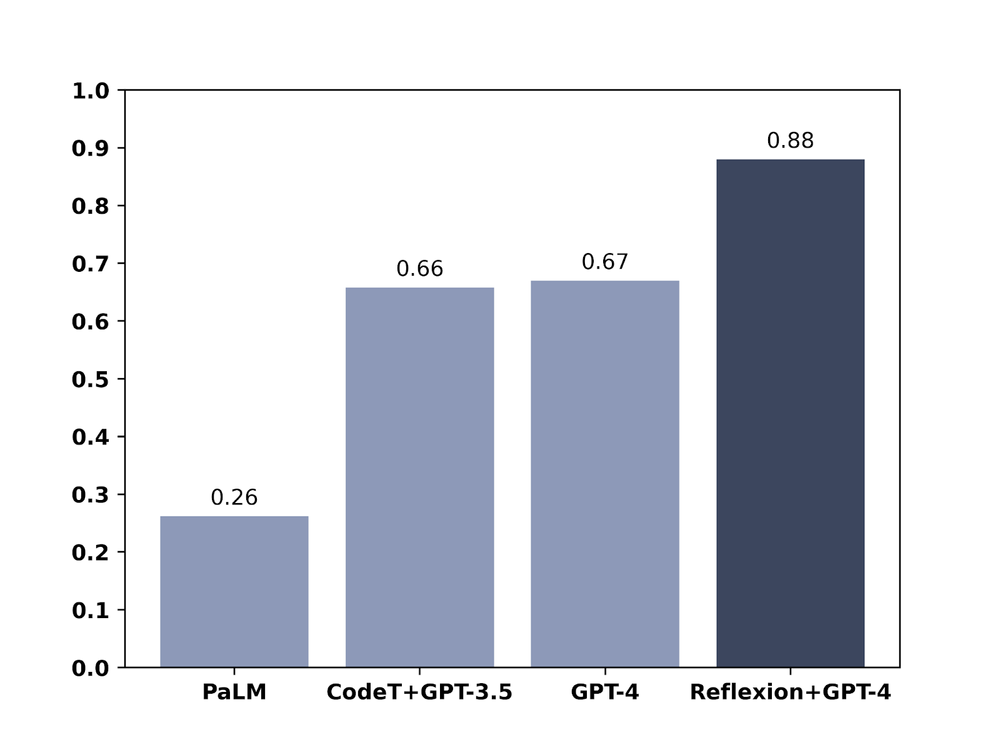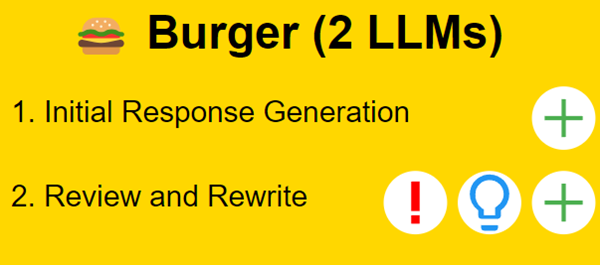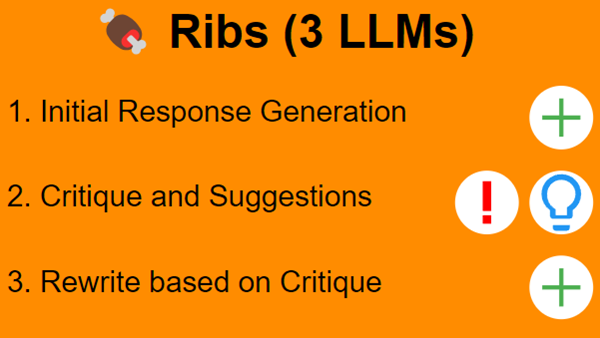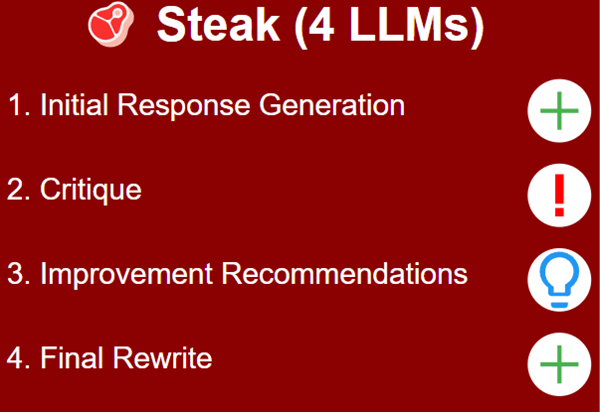Guide
Introduction
Incorporating reflection has been demonstrated to improve LLM quality substantially. While advanced LLMs are still great with their first responses in most cases, there are times when you want to maximise quality. Incorporating this critical reflection and re-writing process ensures the best possible outputs.
The chart below is from the Oct 2023 paper Reflexion: An Autonomous Agent with Dynamic Memory and Self-Reflection illustrates that LLMs can be improved if you give them the opportunity to 'think before they speak':

While myriad 'prompt engineering' strategies have been proposed, chain of thought has been by far the most successful - see this blog referencing a 2024 New York University study: Chain of Thought Reigns Supreme: New Study Reveals the Most Effective AI Prompting Technique
The LLM Beefer Upper is designed to simplify the process, because it can be painful to incorporate these reflection stages in the usual Chat GPT or Claude chat interfaces. This entire app idea came from the fact that I used to do these stages manually but found that I just couldn’t be bothered after a while and ended up with lower quality outputs as a result. This app is designed to simplify and automate the process, letting you create your own multi-agent templates for general tasks (e.g. writing a draft text, generating an FAQ or multi-choice quiz, designing a tutorial from technical documentation, code generation from technical documentation and so on.
The other main benefit is when you run a task, you'll see the full audit trail of each agent's response, making it simpler to verify the 'thought process' as it develops to produce the final response.
The app offers 3 quality beefing up levels. Steak is the highest quality because of the division of labour, e.g. you have one LLM truly dedicated only to critique or only to recommended improvements.
- 🍔 Burger (2 credits): 1 additional LLM agent to review and improve the first output
- 🍖 Ribs (3 credits): 2 additional LLM agents, one to critique and suggest improvements, and one to re-write the response taking on board the 2nd agent's comments
- 🥩 Steak (5 credits): Highest quality with 3 additional LLM agents, one to critique, one to suggest improvements and one to re-write taking on board the previous agents' comments



To help get you started there are lots of pre-built templates, each one having been refined and tested to work effectively. When you add one, it's yours to edit as you see fit. Just note that if you reduce the quality from Steak to Ribs, that removes the 4th LLM from your template entirely, so you'll need to re-write the other agent prompts to fit the ribs model.
You can also use the 'Draft with AI' feature (costs 1 credit) to give you a starting point for your agent prompts which you can edit before saving.
How you create your own templates is entirely up to you. You could have each agent just re-drafting without adding reflection or critique if you want, but the critique/recommend/re-write model are effective, so mirroring your templates on these will get you good results. You can edit your templates whenever you want and it’s encouraged because you will no doubt find ways to improve as you see the results.
Each template always has 2 input boxes: one for provided knowledge (text pasting only for now – RAG quality via file uploads is simply not good enough compared to including knowledge as part of the prompt in text form at this point in time), and one for prompt detail where you can provide instructions and additional context. There are character limits to avoid API errors – you can add far more text input for burger tasks because the amount of text is far smaller than with 4 agents each seeing not only the prompt and knowledge but the previous LLM responses.
Important: referencing the knowledge, prompt and LLM agents must be in this format with curly brackets:
- {prompt_detail} – e.g. “…in the user’s prompt: {prompt_detail}”
- {provided_text} – e.g. “… Analyse the source material in the provided text: {provided_text} thoroughly”
- {agent1_text} – e.g. “… based on the first agent’s response: {agent1_text}”
- {agent2_text} – e.g. “… based on the second agent’s response: {agent2_text}”
- {agent3_text} – e.g. “… based on the third agent’s response: {agent3_text}”
Note on pricing: Since this app has to call an API, costs are of course incurred. The app uses Claude Sonnet 3.5 which is currently the best quality LLM on the market. When a better model comes along, the app will switch to it – this app is not about cutting costs or corners but for getting the best out of the best LLMs. As of Summer 2024, a Steak task (the best quality using 4 LLMs total) requires 5 credits ($0.75), Ribs 3 credits ($0.45) and Burger 2 credits ($0.30). Your credit balance will only be deducted once the outputs have completed.
Example prompt strategies
Steak Level Example - see Pre-built Templates for more examples
Title: FAQ Generation from Source Material (Steak tier: 4 LLMs)
Description: This template creates a well-structured, user-friendly FAQ based on provided source material, tailoring the content and style to the specified audience and context. The process involves initial FAQ creation, accuracy verification, improvement suggestions, and a final polished version.
Prompt Detail Description: Specify the target audience, context, and any specific requirements for the FAQ (e.g., tone, length, format).
Agent 1 Prompt: You are an expert in creating clear, concise, and informative FAQs. Your task is to generate a comprehensive FAQ based on the provided source material, tailored to the specified audience and context. Analyse the source material in the provided text: {provided_text} thoroughly to identify key topics, common questions, and essential information. Please also attend to any specific context requirements in the user’s prompt: {prompt_detail}. Organise the FAQ in a logical structure, using clear and accessible language appropriate for the target audience. Ensure each question is relevant and each answer is informative and complete. Include a mix of basic and more advanced questions to cater to different levels of understanding. Use formatting techniques like bullet points or numbered lists where appropriate to enhance readability. Your goal is to create an FAQ that not only answers questions accurately but also anticipates user needs and provides valuable insights.
Agent 2 Prompt: You are an expert in fact-checking and content verification, solely focused on ensuring accuracy. Your task is to thoroughly review the FAQ generated by the first agent, verifying its accuracy and alignment with the source material and initial prompt. Initial Prompt: {prompt_detail} Provided knowledge base text: {provided_text} First LLM Response: {agent1_text} Compare each question and answer against the original text and prompt, verifying that the information is correct and properly contextualised. Assess the FAQ's coverage of key topics from the source material, identifying any important points that may have been missed or inaccurately represented. Highlight any discrepancies, errors, or potential misinterpretations. Provide a detailed analysis of the FAQ's accuracy, pointing out specific areas that need correction or clarification.
Agent 3 Prompt: You are an expert reviewer specialised in content optimization and user experience. Your task is to provide detailed suggestions for improving the FAQ based on the initial draft, the accuracy evaluation, and the original prompt and source material. Initial Prompt: {prompt_detail} Provided knowledge base text: {provided_text} First LLM Response: {agent1_text} 2nd LLM response: {agent2_text} Focus on enhancing the FAQ's structure, readability, and overall value to the target audience. Suggest ways to clarify complex concepts, add relevant examples or analogies, and improve the flow of information. Recommend additional questions or topics that could be included to make the FAQ more comprehensive. Propose improvements to the formatting and organization to enhance user navigation and information retrieval. Consider how the FAQ could be made more engaging or interactive, if appropriate for the context. Your goal is to transform the FAQ from merely accurate to exceptionally useful and user-friendly, while ensuring it remains true to the original prompt and source material.
Agent 4 Prompt: You are a master communicator and content creator. Your task is to produce the final version of the FAQ, incorporating all previous feedback and suggestions to create an outstanding resource for the target audience. Initial Prompt: {prompt_detail} Provided knowledge base text: {provided_text} First LLM Response: {agent1_text} 2nd LLM response: {agent2_text} 3rd LLM response: {agent3_text} Refine the content, structure, and presentation of the FAQ to ensure it is comprehensive, clear, and engaging, while maintaining strict accuracy to the source material. Strike the perfect balance between accessibility and depth of information. Ensure a consistent tone and style throughout the document that resonates with the intended audience. Add any necessary context or background information to make the FAQ stand alone as a valuable resource. Implement creative solutions to present information effectively, such as using analogies, diagrams, or brief examples where appropriate. Your final product should be a polished, user-centric FAQ that not only answers questions accurately but also educates and empowers its readers, fully addressing the requirements of the initial prompt and expertly synthesising all the feedback from previous stages.
Ribs Level Example
Title: FAQ Generation from Source Material (Ribs tier: 3 LLMs)
Description: This template creates a well-structured, user-friendly FAQ based on provided source material, tailored to the specified audience and context. The process involves initial FAQ creation, combined accuracy verification and improvement suggestions, and a final polished version.
Prompt Detail Description: Specify the target audience, context, and any specific requirements for the FAQ (e.g., tone, length, format).
Agent 1 Prompt: You are an expert in creating clear, concise, and informative FAQs. Your task is to generate a comprehensive FAQ based on the provided source material, tailored to the specified audience and context. Analyse the source material in the knowledge text provided thoroughly to identify key topics, common questions, and essential information: {provided_text}. Please also attend to any specific context requirements in the user’s prompt: {prompt_detail}. Organise the FAQ in a logical structure, using clear and accessible language appropriate for the target audience. Ensure each question is relevant and each answer is informative and complete. Include a mix of basic and more advanced questions to cater to different levels of understanding. Use formatting techniques like bullet points or numbered lists where appropriate to enhance readability. Your goal is to create an FAQ that not only answers questions accurately but also anticipates user needs and provides valuable insights.
Agent 2 Prompt: You are an expert reviewer with a focus on both accuracy and content optimization. Your task is to review the FAQ generated by the first agent, verifying its accuracy and suggesting improvements. Initial Prompt: {prompt_detail} Provided knowledge base text: {provided_text} First LLM Response: {agent1_text}. Compare each question and answer against the original text and prompt, ensuring accuracy and contextual relevance. Suggest ways to clarify complex concepts, add relevant examples or analogies, and improve the flow of information. Recommend additional questions or topics that could be included to make the FAQ more comprehensive. Your goal is to provide a comprehensive critique that ensures accuracy and enhances the overall value of the FAQ.
Agent 3 Prompt: You are a master communicator and content creator. Your task is to produce the final version of the FAQ, incorporating all previous feedback and suggestions to create an outstanding resource for the target audience. Initial Prompt: {prompt_detail} Provided knowledge base text: {provided_text} First LLM Response: {agent1_text} 2nd LLM response: {agent2_text} Refine the content, structure, and presentation of the FAQ to ensure it is comprehensive, clear, and engaging, while maintaining strict accuracy to the source material. Strike the perfect balance between accessibility and depth of information. Ensure a consistent tone and style throughout the document that resonates with the intended audience. Add any necessary context or background information to make the FAQ stand alone as a valuable resource. Implement creative solutions to present information effectively, such as using analogies, diagrams, or brief examples where appropriate. Your final product should be a polished, user-centric FAQ that not only answers questions accurately but also educates and empowers its readers, fully addressing the requirements of the initial prompt and expertly synthesising all the feedback from previous stages.
Burger Level Example
Title: FAQ Generation from Source Material (Burger tier: 2 LLMs)
Description: This template creates a well-structured, user-friendly FAQ based on provided source material, tailoring the content and style to the specified audience and context. The process involves initial FAQ creation and a brief critique followed by a revised version.
Prompt Detail Description: Specify the target audience, context, and any specific requirements for the FAQ (e.g., tone, length, format).
Agent 1 Prompt: You are an expert in creating clear, concise, and informative FAQs. Your task is to generate a comprehensive FAQ based on the provided source material, tailored to the specified audience and context. Analyse the source material in the provided knowledge text thoroughly to identify key topics, common questions, and essential information : {provided_text}. Please also attend to any specific context requirements in the user’s prompt: {prompt_detail}. Organise the FAQ in a logical structure, using clear and accessible language appropriate for the target audience. Ensure each question is relevant and each answer is informative and complete. Include a mix of basic and more advanced questions to cater to different levels of understanding. Use formatting techniques like bullet points or numbered lists where appropriate to enhance readability. Your goal is to create an FAQ that not only answers questions accurately but also anticipates user needs and provides valuable answers.
Agent 2 Prompt: You are an expert in FAQ generation. Your task is to review and improve the FAQ generated by the first agent. Initial Prompt: {prompt_detail} Provided knowledge base text: {provided_text} First LLM Response: {agent1_text}. Focus on improving the quality in reference to accuracy and clarify. Revise the FAQ to correct any errors and enhance its clarity and readability. Your goal is to produce a refined FAQ that is accurate and user-friendly, based on the initial draft and your own insights.

